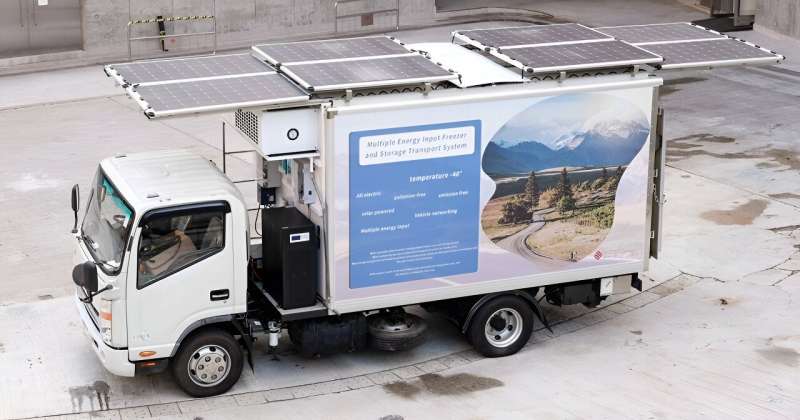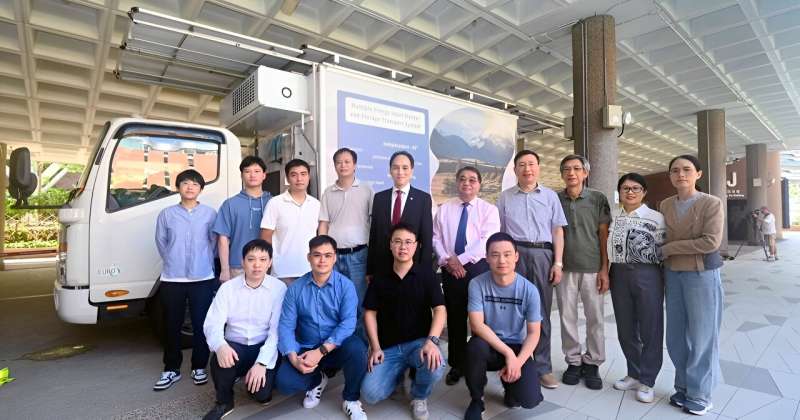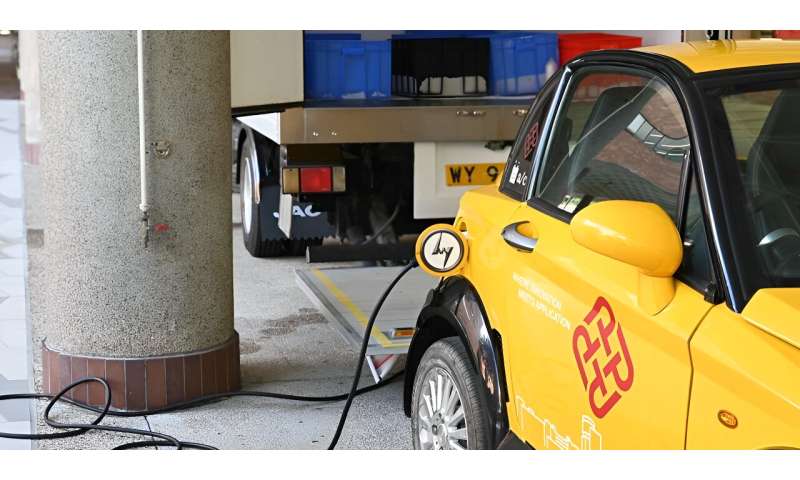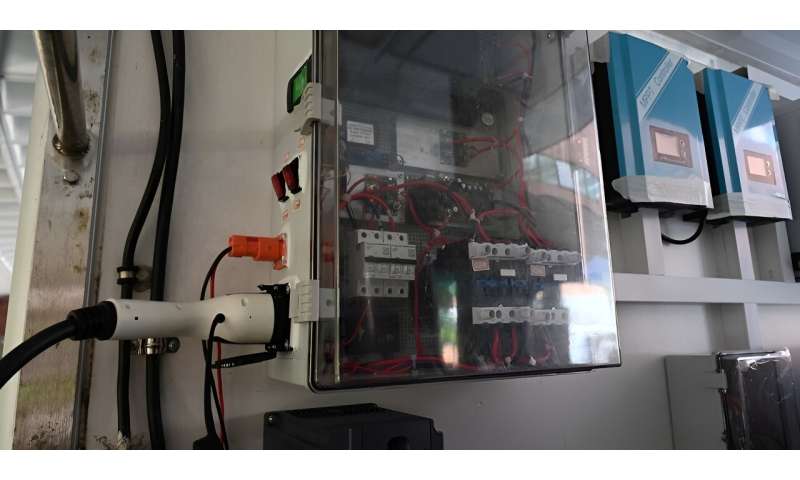
JULY 5, 2024 by Hong Kong Polytechnic University
Collected at: https://techxplore.com/news/2024-07-smart-solar-powered-freezer-truck.html
The transport sector is a significant contributor to greenhouse gas emissions in Hong Kong, accounting for 19% of total emissions. Supporting the development of green transport can help reduce air pollutant emissions. The Hong Kong Polytechnic University (PolyU) is committed to promoting research into green technologies to support Hong Kong’s goal of reducing the City’s total carbon emissions from the 2005 level by half before 2035 and achieving carbon neutrality before 2050.
A research team led by Prof. Eric Cheng, Professor of the Department of Electrical and Electronic Engineering at PolyU, received support from the “Innovation and Technology Support Program (Mid-stream, theme-based)” last June for the research project “Smart Refrigeration Truck Development Program—Power, Solar and Intelligence Method for Logistics and Storage.” The project is aimed at promoting the transformation of freezer trucks from traditional fuel driven freezer system to smart electric driven and strengthening the wider adoption of solar energy.
After one year, the PolyU team has successfully developed a novel freezer truck that supports a solar-powered freezer system and features vehicle-connected power storage and sharing technology. The project has received staunch support from the government, academia and industry, including from Sunlight Eco-tech Limited, Advanced Sunlight Pty Limited from Australia, and the Electrical and Mechanical Services Department.
Currently, there are approximately 5,000 freezer trucks in Hong Kong, and this number is expected to double in the next few years. These vehicles are all powered by fuel engines, which produce a significant amount of exhaust gas and noise when running or idling.

The technology used in conventional freezer trucks is relatively outdated, with the freezer system relying on the vehicle’s internal combustion engine for power. Even when the vehicle is stationary, to maintain operation of the freezer system the engine cannot be turned off.
In addition, the temperature of the freezer system is typically maintained at around -20 degrees Celsius, limiting the types of food that can be refrigerated. If each vehicle consumes one to three liters of diesel per hour, it will produce 2.7 to 8.1 kg of carbon dioxide, resulting in annual emissions of approximately 16 tons. To offset these carbon emissions, about 760 trees need to be planted.
The smart solar-powered freezer truck developed by PolyU provides flexible energy input options. Key highlights are as follows:
Extensible solar photovoltaic (PV) panels: Installed on the roof, these PV panels can be extended to increase the truck’s power output, enhancing its energy efficiency. The truck is equipped with an energy storage device that captures and stores the electric energy generated, providing additional energy for the vehicle’s freezer system.
Onboard lithium-ion battery: In addition to the solar energy storage, the truck also has an onboard lithium-ion battery that can be connected to standard electric vehicle charging facilities for recharging. When the solar energy storage is filled, and the battery is fully charged, they can power the freezer system for up to four hours. Users also have the option to expand the number and capacity of batteries to further extend operation time as needed.
Powerful and versatile freezer system: The onboard refrigeration system can maintain temperatures as low as -45 degrees Celsius. Moreover, it can continue operating even after the electric engine is turned off, effectively transforming the vehicle into a mobile freezer unit. This can help address the shortage of freezer warehouses in Hong Kong.
 The freezer truck can connect to other vehicles of the same type for charging and energy sharing. Credit: 2024 Research and Innovation Office, The Hong Kong Polytechnic University. All Rights Reserved.
The freezer truck can connect to other vehicles of the same type for charging and energy sharing. Credit: 2024 Research and Innovation Office, The Hong Kong Polytechnic University. All Rights Reserved. The truck is equipped with an energy storage device that captures and stores the electric energy generated, providing additional energy for the vehicle’s freezer system. It also has an onboard lithium-ion battery that can be connected to standard electric vehicle charging facilities for recharging. Credit: 2024 Research and Innovation Office, The Hong Kong Polytechnic University. All Rights Reserved.
The truck is equipped with an energy storage device that captures and stores the electric energy generated, providing additional energy for the vehicle’s freezer system. It also has an onboard lithium-ion battery that can be connected to standard electric vehicle charging facilities for recharging. Credit: 2024 Research and Innovation Office, The Hong Kong Polytechnic University. All Rights Reserved.
Furthermore, the freezer truck can connect to other vehicles of the same type for charging and energy sharing. With the vehicle‘s smart energy management system, users can not only monitor and control the maximum output power of the PV panels to enhance efficiency of different energy sources, but also optimize the freezer performance, and prolong the life of the onboard battery.
Prof. Eric Cheng said, “The HKSAR government has implemented several policies in recent years to promote the popularization of electric vehicles, including setting a target to cease new registration of fuel-propelled private cars in 2035 or earlier. However, for freight vehicles, the adoption rate of new energy vehicles is relatively slow.
“We aspire for this research project to take a leading role in encouraging the transport sector to embrace green technologies more readily and contribute more to reducing emissions and achieving carbon neutrality.”
The PolyU smart solar-powered freezer truck is now ready for commercialization, with the expectation that similar vehicles will be launched in the near-future.
Provided by Hong Kong Polytechnic University

Leave a Reply